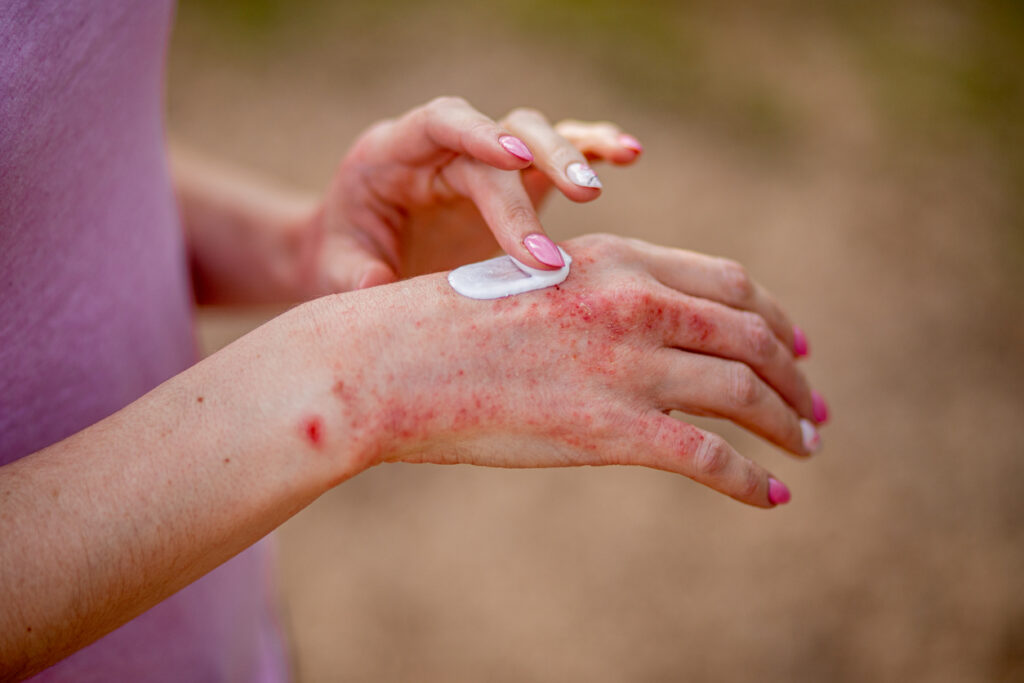Delgocitinib cream 20mg/g bested oral alitretinoin for the treatment of chronic hand eczema, according to the Phase 3 DELTA FORCE trial.
The topical pan-Janus kinase (JAK) inhibitor demonstrated superior treatment effects, quality of life improvements, and a more favorable safety profile compared to oral alitretinoin over 24 weeks.
The new study was selected as a late breaker top five finalist for the best poster Akamai Award at the 2025 Maui Derm Hawaii meeting.
DELTA FORCE was a randomized, assessor-blind, active-controlled, multi-site trial. Adults with severe CHE were randomized 1:1 to delgocitinib cream (n=254) or alitretinoin (n=259) for 24 weeks. The primary endpoint was a change in The Hand Eczema Severity Index (HECSI) from baseline to Week (W) 12. Secondary endpoints included HECSI-90 and the Investigator Global Assessment of Chronic Hand Eczema (IGA–CHE) treatment success (TS) at W12 (IGA-CHE 0/1 [clear/almost clear]), change in The Hand Eczema Symptom Diary (HESD) itch/pain from baseline to W12, area under the curve (AUC) for HECSI-90 and the change in the Dermatology Life Quality Index (DLQI), and change in HECSI from baseline to W24.
A significantly greater least squares (LS) mean decrease in HECSI from baseline to W12 was observed with delgocitinib cream (67.6) vs. alitretinoin (51.5), the study showed. At W12, greater proportions of patients treated with delgocitinib cream vs. alitretinoin achieved HECSI-90 and IGA-CHE. What’s more, greater LS mean decreases from baseline were observed with delgocitinib cream vs. alitretinoin in HESD itch/pain at W12 (3.0/2.9 vs 2.4/2.3) and HECSI at W24 (69.6 vs 45.1); LS mean AUC for HECSI-90 (49.2 vs. 34.9;) and AUC for change in DLQI (1124.7 vs 790.7) were higher with delgocitinib cream vs. alitretinoin. Fewer patients in the delgocitinib cream group than in the alitretinoin group reported adverse events (AEs) (number of events [E]=280 in 125 [49.4%] patients vs. E=620 in 188 [76.1%] patients), serious adverse events (SAEs) (E=5 in 5 [2.0%] patients vs. E=12 in 12 [4.9%] patients), and AEs leading to trial drug discontinuation (E=4 in 3 [1.2%] patients vs. E=44 in 25 [10.1%] patients).
Delgocitinib cream (Leo Pharma, Anzupgo) is currently approved in the European Union and Switzerland for the treatment of moderate to severe CHE in adults for whom topical corticosteroids are inadequate or inappropriate. In addition, the U.S. Food and Drug Administration has accepted LEO Pharma’s filing of a new drug application for delgocitinib cream in CHE. A systemic therapy, alitretinoin, is approved in Canada, the European Union, South Korea, and Israel.


